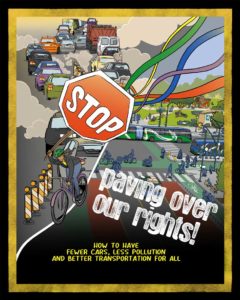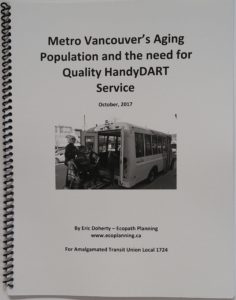Backgrounder – Vehicle Kilometer Traveled (VKT) measurement and estimation in BC (2023)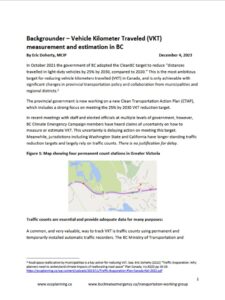
This backgrounder addresses claims of uncertainty on how to measure or estimate vehicle kilometers traveled (VKT) from multiple levels of government in BC. This uncertainty was apparently delaying action on meeting the provincial VKT reduction target.
Services Provided: Research, writing and layout
Client: BC Climate Emergency Campaign
Access for Everyone? Publicly Operated HandyDART in Metro Vancouver (2023) 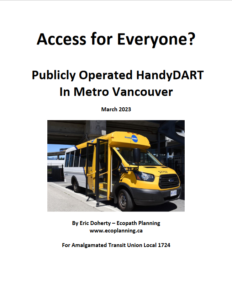
This report documents the failure of HandyDART paratransit service levels to meet the needs of people with disabilities in Metro Vancouver. It shows that the number of HandyDART trips per person over 65 was only half what is was in 2008. The title refers to the TransLink’s Transport 2050 goal of providing “Access for Everyone”, and the recommendation that HandyDART be insourced and operated directly by TransLink.
Services Provided: Research, writing and layout
Client: ATU Local 1724
This comic book is designed to make the connections between transportation, climate, and human rights easy to understand. Stop Paving Over Our Rights: How to have fewer cars, less pollution, and better transportation for all follows Andy and Samira as they organize against a highway expansion project in their neighbourhood. After years of organizing, our heroes get to enjoy the changes in their neighbourhood with far fewer cars and cleaner air.
Services provided: Advice on text and visual elements for comic and associated materials.
Client: Amnesty International Canada
Beyond Batteries: A Just Transition for Transportation (2020) 
This internal discussion paper was intended to deepen Amnesty International Canada’s understanding of the inter-relationship between Canada’s policies on transportation and human rights in Canada and globally. It informed Amnesty International’s global policy on transportation, including the 2021 report Stop burning our rights! What governments and corporations must do to protect humanity from the climate crisis.
Services provided: Research, writing, layout, and advice regarding subsequent policy
Client: Amnesty International Canada
Coastal Ferry Services Review: Climate Action Analysis (2019)
 This report forms part of the Coastal Ferry Services Review, and focuses on how BC Ferries can serve the public interest by contributing to meeting B.C.’s greenhouse gas (GHG) reduction goals. This report includes a set of key recommendations including providing BC Ferries with a clear mandate to consider the public interest in reducing GHG emissions, and creating a coordinating agency to lead GHG reduction efforts in the transportation sector. Potential actions identified include operating ferries on plug in electric power.
This report forms part of the Coastal Ferry Services Review, and focuses on how BC Ferries can serve the public interest by contributing to meeting B.C.’s greenhouse gas (GHG) reduction goals. This report includes a set of key recommendations including providing BC Ferries with a clear mandate to consider the public interest in reducing GHG emissions, and creating a coordinating agency to lead GHG reduction efforts in the transportation sector. Potential actions identified include operating ferries on plug in electric power.
Services provided: Research, writing and layout
Client: BC Ministry of Transportation and Infrastructure
Metro Vancouver’s Aging Population and the need for Quality HandyDART Service (2017)
Metro Vancouver’s Aging Population and the need for Quality HandyDART Service shows how present service levels are grossly inadequate, and how the need is growing faster than ever now that the boomers are entering their 70s. It documents the poor track record that for-profit corporations have for service quality, and suggests operating HandyDART as a subsidiary of TransLink.
Services provided: Research, writing and layout
Client: Amalgamated Transit Union (ATU) Local 1724
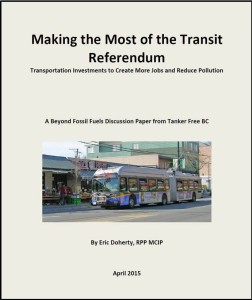 This report is set in the context of the 2015 Metro Vancouver Transit Referendum, but the concepts are applicable everywhere. It documents that improving public transit creates large numbers of good jobs. This is in stark contrast to the much lower numbers of jobs produced by spending in the petroleum sector. The automotive sector and highway and road construction also result in relatively few jobs per dollar spent. Therefore, taking steps to reduce fossil fuel consumption and carbon pollution are ways of enhancing the creation of good local jobs people can feel proud of.
This report is set in the context of the 2015 Metro Vancouver Transit Referendum, but the concepts are applicable everywhere. It documents that improving public transit creates large numbers of good jobs. This is in stark contrast to the much lower numbers of jobs produced by spending in the petroleum sector. The automotive sector and highway and road construction also result in relatively few jobs per dollar spent. Therefore, taking steps to reduce fossil fuel consumption and carbon pollution are ways of enhancing the creation of good local jobs people can feel proud of.
Services provided: Research, writing and layout
Client: Tanker Free BC
Metro Vancouver’s Aging Population and the Need for Improved HandyDART Service (2013)
Over the last five years the number of people over 70 in Metro Vancouver has increased by two and a half times that of the general population. Metro Vancouver’s Aging Population and the Need for Improved HandyDART Service documents how the ongoing increase in older seniors will translate into a greater number of people with disabilities and a resulting need for quality HandyDART service.
Services provided: Research, writing and layout
Client: Amalgamated Transit Union (ATU) Local 1724
Right to Bike: Cycling Instructor Training and Certification Review (2012) 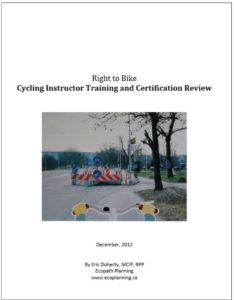
The Right to Bike: Cycling Instructor Training and Certification Review examines select international and Canadian cycling education programs, and makes recommendations for a program that works best in BC. This report has influenced the content of cycling education programs offered by multiple cycling organizations in BC.
Services provided: Research, writing and layout
Client: Right To Bike BC
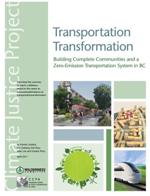 Transportation Transformation: Building Complete Communities and a Zero-Emission Transportation System in BC puts forward a compelling vision for transforming passenger and freight transportation in BC to dramatically reduce greenhouse gas emissions. It proposes measures to enhance equality and quality of life while winning over the wide range of households who are dependent on cars for their mobility because they have ‘just played by the rules’.
Transportation Transformation: Building Complete Communities and a Zero-Emission Transportation System in BC puts forward a compelling vision for transforming passenger and freight transportation in BC to dramatically reduce greenhouse gas emissions. It proposes measures to enhance equality and quality of life while winning over the wide range of households who are dependent on cars for their mobility because they have ‘just played by the rules’.
Services provided: Research, writing and collaborative editing
Client: Wilderness Committee in collaboration with the Canadian Center for Policy Alternatives’ Climate Justice Project
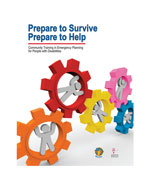 Prepare to Survive Prepare to Help is a train-the-trainer manual based on the latest research on successful disaster planning by and for people with disabilities. Designed to meet the objectives of the Social Organization Framework for Emergency Planning Project, this manual features inclusive approaches for engaging civil society organizations in emergency planning. Also available in French.
Prepare to Survive Prepare to Help is a train-the-trainer manual based on the latest research on successful disaster planning by and for people with disabilities. Designed to meet the objectives of the Social Organization Framework for Emergency Planning Project, this manual features inclusive approaches for engaging civil society organizations in emergency planning. Also available in French.
Services provided: Research, writing and editing
Client: BC Coalition of People with Disabilities and Volunteer Canada (Prepared in association with the Hatching Change Facilitation Collective).
Wilderness Committee Educational Reports (2008-2010)
Oil Tanker Ban – Lets Keep Canada’s West Coast Oil Spill Free (2010)
Canada’s threatened bird nursery: The boreal forest (2009)
Stuck in traffic? We have a choice! (2008)
 Wilderness Committee educational reports are short, compelling and easy to read. And they also have to be carefully researched and fact checked. These examples touch on climate, energy, and transportation while maintaining compatibility with the wilderness and wildlife focus of the organization.
Wilderness Committee educational reports are short, compelling and easy to read. And they also have to be carefully researched and fact checked. These examples touch on climate, energy, and transportation while maintaining compatibility with the wilderness and wildlife focus of the organization.
Services provided: Research, writing and editing
Client: Wilderness Committee
Transportation Cost and Benefit Analysis: Techniques, Estimates and Implications. Second Edition (2009).
 This 500+ page on-line guidebook provides a comprehensive overview of transportation cost benefit analysis. It is one of the most comprehensive sources on the subject, including many often-overlooked impacts. The spreadsheet allows users to adapt this analysis to a wide variety of policy and planning situations.
This 500+ page on-line guidebook provides a comprehensive overview of transportation cost benefit analysis. It is one of the most comprehensive sources on the subject, including many often-overlooked impacts. The spreadsheet allows users to adapt this analysis to a wide variety of policy and planning situations.
Services provided: Research, writing and editing for a major update of the first edition
Client: Victoria Transport Policy Institute
Climate Change Emission Valuation for Transportation Economic Analysis (2009)
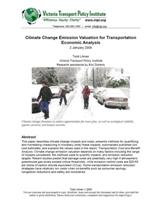 Greenhouse gas (GHG) emissions are one of the most challenging and controversial costs to quantify. This research paper documents the extremely wide range of cost estimates, and why they vary so much. It also provides guidance for using lifecycle GHG emissions, as opposed to only tailpipe emissions, in evaluation policy and infrastructure alternatives.
Greenhouse gas (GHG) emissions are one of the most challenging and controversial costs to quantify. This research paper documents the extremely wide range of cost estimates, and why they vary so much. It also provides guidance for using lifecycle GHG emissions, as opposed to only tailpipe emissions, in evaluation policy and infrastructure alternatives.
Services provided: Research assistance and writing
Client: Victoria Transport Policy Institute
AMS Lighter Footprint Strategy (2008)
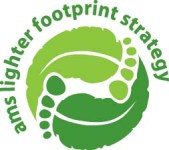 The innovative Lighter Footprint Strategy is designed to help the Student Society at the University of British Columbia (AMS) focus on the areas that will have the greatest impact. Unlike many other sustainability strategies that set dozens of targets, this strategy sets out a relatively simple process to select a manageable number of targets and actions. The strategy is designed to reduce ecological footprint, a concept developed at the UBC School of Community and Regional Planning and now used in sustainability planning around the world.
The innovative Lighter Footprint Strategy is designed to help the Student Society at the University of British Columbia (AMS) focus on the areas that will have the greatest impact. Unlike many other sustainability strategies that set dozens of targets, this strategy sets out a relatively simple process to select a manageable number of targets and actions. The strategy is designed to reduce ecological footprint, a concept developed at the UBC School of Community and Regional Planning and now used in sustainability planning around the world.
Services provided: Consultation, concept development and writing
Client: Alma Mater Society (Students’ Society) University of British Columbia
Transportation for a Sustainable Region: Transit or Freeway Expansion? (2006)

This influential report analyzes traffic patterns along a proposed freeway expansion route, and shows that a large proportion of the trips could be served efficiently by public transit. The report suggests a series of cost-effective transit investments which would meet the stated objectives of the government agencies involved better than the freeway expansion.
Services provided: Research, writing and post-release media interviews
Client: Livable Region Coalition (Including the David Suzuki Foundation, Smart Growth BC, BC Sustainable Energy Association, Society Promoting Environmental Conservation, and Better Environmentally Sound Transportation)
Green Electricity Resources of British Columbia (2002)
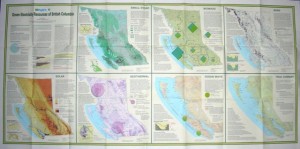 Green Electricity Resources of British Columbia is a wall map with information on Small Hydro, Biomass, Wind, Solar, Geothermal, Ocean Wave and Tidal Current energy resources. It is designed to provide the general public and BC Hydro staff with basic information on the potential for generating low-carbon electricity across the province. The map includes graphs of the seasonal and daily variation of electricity consumption, and how well potential resources match that demand curve“ which is essential information for energy system planning.
Green Electricity Resources of British Columbia is a wall map with information on Small Hydro, Biomass, Wind, Solar, Geothermal, Ocean Wave and Tidal Current energy resources. It is designed to provide the general public and BC Hydro staff with basic information on the potential for generating low-carbon electricity across the province. The map includes graphs of the seasonal and daily variation of electricity consumption, and how well potential resources match that demand curve“ which is essential information for energy system planning.
Services provided: Project management, research, writing and editing)
Client: BC Hydro – Green and Alternative Energy Division in collaboration with Canadian Cartographics

